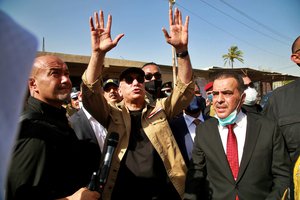
Prime Minister of Iraq
The Prime Minister of Iraq is Iraq's head of government. Prime Minister was originally an appointed office, subsidiary to the head of state, and the nominal leader of the Iraqi parliament. Under the newly adopted constitution the Prime Minister is to be the country's active executive authority. Nouri al-Maliki (formerly Jawad al-Maliki) was selected to be Prime Minister on 21 April 2006. On 14 August 2014 al-Maliki agreed to step down as prime minister of Iraq to allow Haider al-Abadi to take his place.
Appointment
The Council of Representatives elected the President of the Republic and his Deputies, including the President of the Council of Ministers and Ministers.
The Presidency Council then shall name a Prime Minister unanimously. According to this, The Presidency Council must agree on a candidate for the post within two weeks. In the event that it fails to do so, the responsibility of naming the Prime Minister reverts to the National Assembly. In that event, the Council of Representatives must confirm the nomination by a absolute majority. If the Prime Minister is unable to nominate his Council of Ministers within one month, the Presidency Council shall name another Prime Minister.

Prime minister
A prime minister is the most senior minister of cabinet in the executive branch of government, often in a parliamentary or semi-presidential system. In many systems, the prime minister selects and may dismiss other members of the cabinet, and allocates posts to members within the government. In most systems, the prime minister is the presiding member and chairman of the cabinet. In a minority of systems, notably in semi-presidential systems of government, a prime minister is the official who is appointed to manage the civil service and execute the directives of the head of state.
In parliamentary systems fashioned after the Westminster system, the prime minister is the presiding and actual head of government and head of the executive branch. In such systems, the head of state or the head of state's official representative (i.e. the monarch, president, or governor-general) usually holds a largely ceremonial position, although often with reserve powers.
The prime minister is often, but not always, a member of parliament and is expected with other ministers to ensure the passage of bills through the legislature. In some monarchies the monarch may also exercise executive powers (known as the royal prerogative) that are constitutionally vested in the crown and may be exercised without the approval of parliament.

Prime Minister of Spain
The President of the Government of Spain (Spanish: Presidente del Gobierno), formally known by English-speaking nations and formally translated by the European Commission Directorate-General in English as Prime Minister is the head of Government of Spain. The current office is established under the Constitution of 1978.
The King of Spain nominates a candidate for the presidency who stands before the Congress of Deputies of Spain, the lower house of the Cortes Generales (parliament), for a vote of confidence in a process known as a parliamentarian investiture, effectively an indirect election of the head of government by the elected Congress of Deputies. In practice, the Prime Minister is almost always the leader of the largest party in the Congress. Since current constitutional practice in Spain calls for the King to act on the advice of his ministers, the Prime Minister is effectively the country's chief executive.
Mariano Rajoy Brey of the People's Party has been the prime minister since he was sworn in on December 21, 2011, after winning the 2011 general election.

List of heads of government of Liechtenstein
This is a list of the Regierungschef (Heads of Government or Prime Ministers) of Liechtenstein.
The current Regierungschef is Adrian Hasler, since 27 March 2013.
Prime Ministers of Liechtenstein (1921–present)
See also
External links

Prime Minister of Iraq
The Prime Minister of Iraq is Iraq's head of government. Prime Minister was originally an appointed office, subsidiary to the head of state, and the nominal leader of the Iraqi parliament. Under the newly adopted constitution the Prime Minister is to be the country's active executive authority. Nouri al-Maliki (formerly Jawad al-Maliki) was selected to be Prime Minister on 21 April 2006. On 14 August 2014 al-Maliki agreed to step down as prime minister of Iraq to allow Haider al-Abadi to take his place.
Appointment
The Council of Representatives elected the President of the Republic and his Deputies, including the President of the Council of Ministers and Ministers.
The Presidency Council then shall name a Prime Minister unanimously. According to this, The Presidency Council must agree on a candidate for the post within two weeks. In the event that it fails to do so, the responsibility of naming the Prime Minister reverts to the National Assembly. In that event, the Council of Representatives must confirm the nomination by a absolute majority. If the Prime Minister is unable to nominate his Council of Ministers within one month, the Presidency Council shall name another Prime Minister.
Latest News for: iraqi prime minister
Iraqi premier calls early elections in June 2021, one year earlier than scheduled
UN welcomes Iraqi PM’s proposal for early elections

UN welcomes setting date for early elections in Iraq
Iraqi Prime Minister must move fast or risk public resentment, experts say
Xinhua Middle East news summary at 2200 GMT, Aug. 1
Qatar- Amir holds phone talk with Iraqi PM
Quotes of the Day from Xinhua World News, Aug. 1
King Salman send Eid greetings after leaving hospital
- 1
- 2
- Next page »
Article Search
Most Viewed
Yahoo Daily News | 01 Aug 2020
Information Clearing House | 01 Aug 2020
Yahoo Daily News | 01 Aug 2020
Business Insider | 01 Aug 2020
Yahoo Daily News | 01 Aug 2020






































